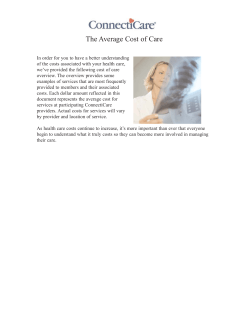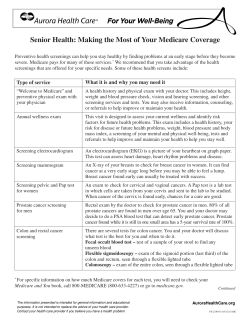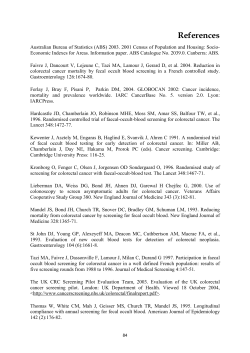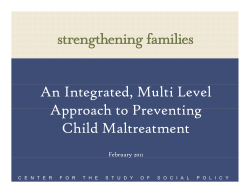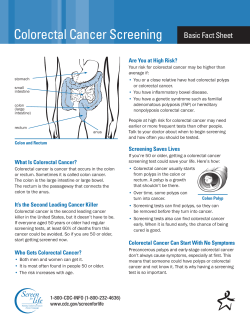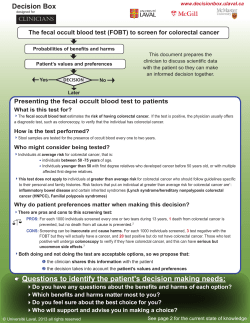
Preventive Health Guidelines 2009
Preventive Health Guidelines 2009 When it comes to your health, some things are beyond your control. But one thing you can control is whether or not to visit your doctor for routine immunizations and testing. These “preventive” visits are important because they promote early detection of illness or disease before it becomes serious. At ConnectiCare, we encourage you to review these guidelines closely and keep them handy —for years of good health. ADULTS Immunizations and Testing RECOMMENDED ADULT IMMUNIZATION SCHEDULE VACCINE Ä AGE GROUP (YRS) © TETANUS, DIPHTHERIA, PERTUSSIS (TD/TDAP)* HUMAN PAPILLOMAVIRUS (HPV)* 19-26 years 27-49 years 50-59 years 60-64 years > 65 years Td booster every 10 yrs Substitute 1-time dose of Tdap for Td booster; then boost with Td every 10 yrs 3 doses (females) VARICELLA* 2 doses ZOSTER 1 dose MEASLES, MUMPS, RUBELLA (MMR)* INFLUENZA* PNEUMOCOCCAL (polysaccharide) 1 dose 1 or 2 doses 1 dose annually 1 or 2 doses 1 dose HEPATITIS A* 2 doses HEPATITIS B * 3 doses MENINGOCOCCAL* 1 or more doses For all persons in this category who meet the age requirements and who lack evidence of immunity (e.g., lack documentation of vaccination or have no evidence of prior infection) Recommended if some other risk factor is present (e.g., on the basis of medical, occupational, lifestyle, or other indications) *Covered by the Vaccine Injury Compensation Program This schedule indicates the recommended age groups and medical indications for which administration of currently licensed vaccines is commonly indicated for adults ages ≥ 19 years, as of January 1, 2009. Licensed combination vaccines may be used whenever any components of the combination are indicated and when the vaccine’s other components are not contraindicated. For detailed recommendations on all vaccines, including those used primarily for travelers or that are issued during the year, consult the manufacturers’ package inserts and the complete statements from the Advisory Committee on Immunization Practices (www.cdc.gov/vaccines/pubs/ACIP-list.htm). Report all clinically significant postvaccination reactions to the Vaccine Adverse Event Reporting System (VAERS). Reporting forms and instructions on filing a VAERS report are available at www.vaers.hhs.gov or by telephone, 800-822-7967. Information on how to file a Vaccine Injury Compensation Program claim is available at www.hrsa.gov/vaccinecompensation or by telephone, 800-338-2382. To file a claim for vaccine injury, contact the U.S. Court of Federal Claims, 717 Madison Place, N.W., Washington, D.C. 20005; telephone, 202-357-6400. Additional information about the vaccines in this schedule and contraindications for vaccination is also available at www.cdc.gov/vaccines or from the CDC-INFO Contact Center at 800-CDC-INFO (800-2324636) in English and Spanish, 24 hours a day, 7 days a week. Use of trade names and commercial sources is for identification only and does not imply endorsement by the U.S. Department of Health and Human Services. ADULTS Immunizations and Testing, continued HEALTH MAINTENANCE VISIT (QIC) ■ Health Maintenance Visit schedules will vary on the patient’s risk factors, age and need for preventive screening. The following is a suggested schedule for Health Maintenance Visits. ■ 21-49: every one to three years as appropriate; ■ 50 plus: annually as appropriate ■ FASTING BLOOD SUGAR (ADA) (Checks for diabetes) ■ Begin at age 45; then every three years. If risk factors present, begin at an earlier age and/or more frequently. ■ ■ ■ ■ ■ ■ ■ ■ CHOLESTEROL SCREENING (NHLBI) (Early detection of heart disease) ■ Adults age 20 or older should have a fasting total, LDL, and HDL cholesterol and triglycerides once every 5 years. COLON CANCER SCREENING (ACS) (Early detection of colon cancer) Beginning at age 50 both men and women at average risk for developing colorectal cancer should follow one of the screening tests below. The tests that are designed to find both early cancer and polyps are preferred if these tests are available to you and you are willing to have one of these more invasive tests. Talk to your doctor about which test is best for you. Tests that find polyps and cancer ■ Flexible sigmoidoscopy every 5 years* ■ Colonoscopy every 10 years ■ Double contrast Barium Enema every 5 years* ■ CT colonography (virtual colonoscopy) every 5 years* (Requires prior authorization) Tests that mainly find cancer ■ Fecal occult blood test (FOBT) every year* ** ■ Fecal immunochemical test (FIT) every year* ** ■ Stool DNA test (sDNA), interval uncertain* (Requires prior authorization) *Colonoscopy should be done if test results are positive. ** For FOBT or FIT used as a screening test, the take-home multiple sample method should be used. A FOBT or FIT done during a digital rectal exam in the doctor’s office is not adequate for screening. People should talk to their doctor about starting colorectal cancer screening earlier and/or being screened more often if they have any of the following colorectal cancer risk factors: ■ A personal history of colorectal cancer or adenomatous polyps ■ A personal history of chronic inflammatory bowel disease (Crohns disease or ulcerative colitis) ■ A strong family history of colorectal cancer or polyps (cancer or polyps in a firstdegree relative younger than 60 or in two first-degree relatives of any age) ■ A known family history of a hereditary colorectal cancer syndrome, such as familial adenomatous polyposis or hereditary non-polyposis colon cancer. PREVENTION AND SCREENING FOR OSTEOPOROSIS BMD (NOF) The Guideline for Bone Mineral Density Testing is suggested for the following: ■ All women who are aged 65 and older regardless of risk factors ■ A postmenopausal woman under age 65 with one or more risk factors for osteoporosis ■ A woman going through menopause with certain risk factors ■ A woman or man after age 50 who has a broken bone ■ A man age 50-70 with one or more risk factors for osteoporosis ■ A man age 70 or older, even without any risk factors ■ A postmenopausal woman who has stopped taking estrogen therapy (ET) or hormone therapy (HT) Risk Factors that Increase the Likelihood for Developing Osteoporosis and Fractures: ■ Personal history of fracture after age 50 ■ Current low bone mass ■ History of fracture in 1st degree relative ■ Being female ■ Being thin and having a small frame ■ Advanced age ■ A family history of osteoporosis or broken bones ■ Estrogen deficiency as a result of menopause, especially early or surgically induced ■ Abnormal absence of menstrual periods (amenorrhea) Low lifetime calcium intake Diet with excessive intake of protein, sodium, and caffeine. Vitamin D deficiency Use of certain medications, such as steroids, some anticonvulsants, and others Certain diseases and conditions, such as anorexia nervosa, rheumatoid arthritis, gastrointestinal diseases and others Low testosterone levels in men An inactive lifestyle Cigarette smoking Alcohol abuse Certain race/ethnicities such as Caucasian, Asian, or Hispanic/Latino although African Americans are also at risk Frequency of Testing for Bone Density Testing: Should be performed once every two to five years, depending on risk factors and results. However, for those on a treatment program, the recommendation would be every 2 years, using the same modality, as treatment decisions are often made on the basis of bone density changes. More frequent screening may also be recommended based on medical necessity but the physician must obtain prior authorization. ROUTINE VISION SCREENING (ADA) (SNELLEN ACUITY TESTING) (Checks for eye problems) ■ 20-29: Individuals at risk for Glaucoma should have an eye exam every 3-5 years. Others should have an exam once during this period. ■ 30-39: Individuals at risk for Glaucoma should have an eye exam every 2-4 years. Others should have an eye exam at least twice during this period. ■ 40-64: Eye exam every 2-4 years ■ 65 and older: Eye exam every 1-2 years PNEUMOCOCCAL VACCINE (CDC) (Prevents pneumonia) Age 65: Vaccination for persons age 65 and older. A second dose is recommended for those people age 65 and older who got their first dose when they were under 65, if 5 or more years have passed since that dose. Under 65: Vaccination and repeat booster 5 years after the first dose for persons who have: ■ Chronic illness: cardiovascular disease, pulmonary disease, diabetes, alcoholism, cirrhosis or cerebrospinal fluid leaks, functional or anatomic asplenia (i.e. sickle cell disease or splenectomy). ■ Immunocompromised individuals (i.e. cancer, lymphoma, leukemia, organ or bone marrow transplant, radiation. ■ Persons with HIV infection or AIDS. ■ Renal failure/nephrotic syndrome. ■ Taking medications that lower immunity (i.e. chemotherapy or long-term systemic corticosteroids. INFLUENZA VACCINE (CDC) (Prevents the flu) ■ Household contacts and out-of-home caretakers of infants/children 0-59 months. ■ All women who will be pregnant at any time during the influenza season should be vaccinated. ■ Persons age 50 or older. ■ Residents of long-term care facilities housing persons with chronic medical conditions. ■ People with chronic disease (diabetes, heart/lung disease, asthma, renal dysfunction, immunosuppression). ■ Health care workers and household members coming in close contact with people at risk. TESTICULAR SCREENING (ACS) ■ A testicular examination should be part of a routine cancer-related checkup. PROSTATE SCREENING (ACS) Annual PSA testing with DRE beginning at age 50 annually: ■ Men with family history of prostate cancer in first-degree relatives (father and brothers) and African Americans should begin testing at age 45. ■ Men at even higher risk, due to multiple first-degree relatives affected at an early age, could begin testing at age 40 (depending on the results of this initial test, no further testing might be needed until age 45) ■ Cessation of testing is at the physician’s discretion ADULTS Immunizations and Testing, continued FOR WOMEN ONLY BREAST EXAM BY PHYSICIAN (ACOG) Early detection of breast cancer ■ Clinical Breast Exam (CBE) is recommended for all women annually as part of the annual physical examination. BREAST SELF-EXAM (ACOG) Early detection of breast cancer ■ Recommended monthly to begin at age 20 and over. MAMMOGRAPHY* (ACOG) Early detection of breast cancer ■ 40-49: every one to two years ■ 50 and older: annually * CT and MA State Law: Age 35-39 Baseline Age 40 and over annually CHLAMYDIA & GONORRHEA SCREENING (ACOG) Detection of sexually transmitted disease (STD) ■ Annual screening for chlamydia and gonorrhea infection in all sexually active women age 25 and younger, as well as other asymptomatic women who are at high risk for infection. CERVICAL CANCER SCREENING (ACOG) (PAP smear) Annual cervical cytology screening should begin approximately 3 years after initiation of sexual intercourse or by age 21, whichever comes first. Women up to age 30 should undergo annual cervical cytology screening. Women of any age who are immunocompromised, are infected with HIV, or were exposed in utero to diethylstilbestrol (DES) should be screened annually. Screening options for women age 30 years and older: ■ Cervical Cytology screening can be performed every 2-3 years after 3 consecutive negative Pap test results. ■ Annual cervical cytology testing ■ Cytology with the addition of an HPV-DNA test. If both the cervical cytology and the DNA test are negative, rescreening should occur no sooner than 3 years. PREGNANCY Prenatal Care (ACOG) Visits include, but are not limited to: medical history, medication review, physical, including blood pressure, weight, urine for protein, glucose levels, uterine size, fetal heart rate, pelvic exam, and initial labs, including HIV testing, screening for risk factors of premature delivery, routine lab assessment, assessment of gestational age, genetic screening/teratology counseling, counseling/education on nutrition, exercise, pre-term labor, fetal monitoring, childbirth, anesthesia, cesarean section, smoking, drinking or drug use during pregnancy, and postpartum depression. Flu immunization is recommended for women who will be pregnant anytime during the influenza season. Timing of prenatal care for uncomplicated pregnancy: ■ One-12 weeks gestation one visit–screen for cystic fibrosis if not done prior to pregnancy ■ One-28 weeks gestation every four weeks ■ 28-36 weeks gestation every two-three weeks–Gestational diabetes screening and group B strep screening ■ 36 weeks until delivery every week Post-Partum Care (ACOG) Four to six weeks after vaginal delivery or sooner, as clinically appropriate. Seven to 14 days after cesarean section, or as clinically appropriate. Visits include, but are not limited to: physical examination, evaluation of weight; blood pressure; breast and abdomen, and pelvic exam; episiotomy repair and uterine involution evaluation and a Pap test performed, if needed; Post-Partum depression screening; counseling on future health and pregnancies; lab data as indicated; review of immunizations. Before seeking care described in these guidelines, please verify coverage by referring to your Membership Agreement, Summary Plan Description or Benefit Summary. Please note: not all of the services outlined in this brochure are covered by your ConnectiCare plan. The Preventive Health Guidelines were adopted from the following sources: American Academy of Child & Adolescent Psychiatry (AACAP) www.aacap.org American Academy of Pediatrics (AAP) www.aap.org American Academy of Ophthalmology (AAO) www.aao.org American Cancer Society (ACS) www.cancer.org American College of Obstetricians & Gynecologists (ACOG) www.acog.org American Diabetes Association (ADA) www.diabetes.org American Heart Association (AHA) www.americanheart.org American Medical Association (AMA) www.ama-assn.org American Psychiatric Association (APA) www.psych.org CCI - Quality Improvement Committee (ConnectiCare, Inc. Physicians) Centers for Disease Control (CDC) www.cdc.gov National Heart, Lung, Blood Institute (NHLBI) www.nhlbi.nih.gov National Osteoporosis Foundation (NOF) www.nof.org US Food & Drug Administration (FDA) www.fda.gov US Preventive Services Task Force (USPSTF) www.ahrq.gov/clinic/uspstfix.htm www.connecticare.com Coverage is provided by and services are administered as follows: In Connecticut: Group HMO and POS coverage, and Individual HMO is underwritten by ConnectiCare, Inc.; Individual POS is underwritten by ConnectiCare Insurance Company, Inc. In Massachusetts: Group HMO and POS coverage is underwritten by ConnectiCare of Massachusetts, Inc. In New York: HMO and POS is underwritten by ConnectiCare of New York, Inc. FlexPOS, PPO coverage, ASO/Self-funded services, and Dental products are administered or underwritten by ConnectiCare Insurance Company, Inc. PHG Men&Women May 2009
© Copyright 2025
